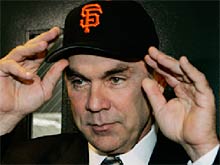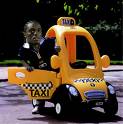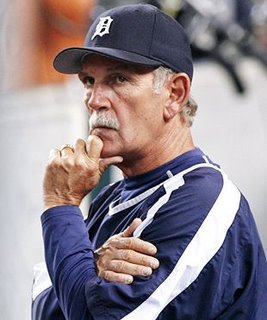This team was as hot and cold as the sink in your bathroom. After an opening day gem by Jake Peavy, the Friars promptly lost four in a row. From the last day in April to May 14th they went a scorching 14-1, with only an extra-inning loss to the Brewers uglying up a historic streak. And then? They lost six of the next seven.
On and on this bi-polar team went, winning three and then losing four. Winning two and losing two. But when they needed it - and boy, did they need it - the Padres ended the year by going 28-13 over the last month and a half. They tied the Dodgers for the NL West lead, and won the division based on the head-to-head records.
I remember thinking in early October, in the immortal words of Willie Mays Hayes boarding a seemingly lavish jumbo jet to Milwaukee, "This is good. Real good." The Padres would be facing the Cardinals, a team that was backing into the playoffs so hard you could hear the "beep-beep-beep" from Wichita.
Something happened, though, in the thick October air, something that had happened all year but had never really been publicized because they always seemed to do something to cover it up: the Padres couldn't hit the goddamned ball.
We knew this going in: the Padres would have to pitch very, very well and play solid defense, and maybe pick up a timely hit or two. But here are the facts in their four-game ousting at the hands of the Redbirds: 29 for 129 (.225 AVG) with 0 - yes, zero - home runs. I'd go into detail about their average with runners in scoring position, but I'm on the twelfth floor of a building right now and the windows over there on that wall are big.
So what happens?
This.

Ugh. You know what that "SF" means? Sorry, Fuckers.
I mean, I know there had been grumblings, and I had heard things (I am in New York, remember, where San Diego is usually talked about only when discussing "Anchorman"), but not enough to expect this.
And during the WORLD FREAKING SERIES nonetheless. There are many unwritten rules in baseball, chiefly A) you don't steal a base when up by a large margin, B) you don't bunt to break up a no-hitter, and C) you don't hire a manager during a World Series.
Maybe I'm old-fashioned, I don't know, but this seemed, well, dirty. He's been with the organization almost as long as I've been alive. There's only a handful of professional coaches/managers who had been with their team as long or longer (Bobby Cox, Jerry Sloan, Bill Cowher and Jeff Fisher come to mind - I'm not gonna do the fucking research, though, so if you're curious, do it yourself) and Bruce Bochy, with his strange smile and creepy-ass eyelid, said "San Diego Padres" as much as my man Tony's finely-tuned physique in a Pads jersey and Hoffman running onto the field to the tune of "Hell's Bells."
But now that's gone. Washed away like a sandcastle on the San Diego beach. The image is still there - an imprint, if you will - but the frothy foam has torn it asunder and carried it away to its new life, to be mixed with seashells and sandcrabs and Moises Alou's urine-soaked hands.
Oh, I'll have my memories. Ken Caminiti's steroids, Snickers and IV-infused run to the MVP and division crown in 1996. The quality club that ran into an epic Yankees team in 1998 (that was a strike on that 2-2 pitch, with the bases loaded, to Tino Martinez in the bottom of the seventh of Game One, with the score tied at 2, if you remember; and if you don't, just humor me). These last two division titles, and the subsequent waxing at the hands of the St. Louis squad (and 2006 World Series Champions, by the way). I'll look back at Bruce's tenure fondly, like that cute girlfriend in high school who would let you make out with her behind the small gym, and maybe feel a breast at the movies, but would never let you round third and head for home.
But you know what? He wasn't even a .500 manager (951-975). Sure he delivered four of the five postseason appearances in the franchise's history, but you've got to look forward (and I will, later). What's done is done: he's the Giants manager now, and if Barry Bonds decides to leave, maybe he'll leave behind his gigantic hats for Bruce so the Giants don't have to go through the trouble of bronzing them as a humongous statue outside AT&T Park.
All I know is this: if you re-arrange the letters in "Bruce Bochy" you get "Curb, Beyoch."
Adios, Bruce. It was nice knowin' ya.
See you on April 3rd.

